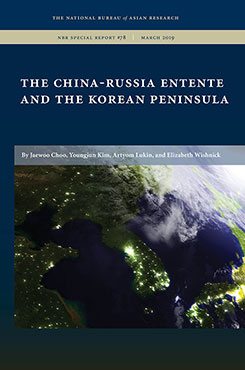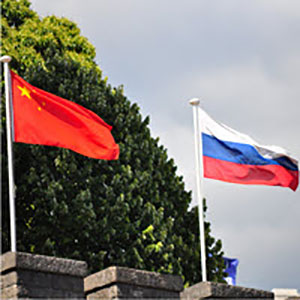North Korea’s Relations with China and Russia in the Security Realm
This essay examines the relations of the Democratic People’s Republic of Korea (DPRK) with both the People’s Republic of China (PRC) and Russia in the security realm and discusses policy implications for the U.S. alliance with the Republic of Korea (ROK) and Northeast Asian stability.
EXECUTIVE SUMMARY
MAIN ARGUMENT
The DPRK has rapidly changed its strategic course since the beginning of 2018, and many parts of its strategic goals remain unexplored. While North Korea’s trade and economy have heavily depended on China, its military and security strategy has sought independence from China and has recently focused on Russia. It is not new for North Korea’s leadership to seek independence from China in the security realm. The country’s juche (self-reliance) ideology dates back to the leadership of Kim Il-sung, the founder of North Korea. Following the end of the Cold War in 1991, as Russia ended its support to North Korea and opened relations with South Korea, the DPRK’s dependence on the Chinese economy increased. During his leadership, Kim Jong-il tried to reduce this heavy dependence on China, but failed. Today, Kim Jong-un is attempting to reduce North Korean dependence on China by looking to Russia as an alternative partner. Broadly, North Korea wishes to benefit by balancing its position, on the one hand, between China and Russia and, on the other hand, between China and the U.S. and its allies.POLICY IMPLICATIONS
- North Korea’s strategy of balancing between China and Russia should be closely monitored, though it is unlikely that North Korea would ever reach closer relations with Russia than with China.
- North Korea’s balancing strategy between the U.S. and China and Russia is a key issue and presents an opportunity for the U.S. and its allies to shape a new order in Northeast Asia amid escalating U.S.-China strategic rivalry.
- North Korea views China’s recent major military exercise in Manchuria and its expansion of the People’s Liberation Army as more threatening than reassuring and now is starting to consider the U.S. and South Korea as potential partners for economic development to reduce Chinese influence.
- The recent warming of North-South relations, including the new military agreement and progress toward a declaration of the end of the Korean War, will be an opportunity to upgrade the U.S.-ROK alliance rather than to reduce its significance.
Youngjun Kim is a Professor of National Security Affairs at the National Security College of the Korea National Defense University.



